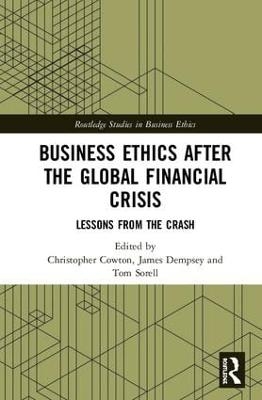
Business Ethics After the Global Financial Crisis
Routledge (Verlag)
978-1-138-33050-4 (ISBN)
The global financial crisis (GFC) that began in 2007 concentrated attention on the morality of banking and financial activities. Just as mainstream businesses became increasingly defined by their financial performance, banks, it seemed, got themselves – and everyone else – into trouble through an over-emphasis on themselves as commercial enterprises that need pay little attention to traditional banking virtues or ethics. While the GFC had many causes, criticism was legitimately levelled at banks over the ethics of mortgage creation, excessive securitisation, executive remuneration, and high-pressure customer sales tactics, amongst other things. These criticisms mirror those that have been levelled at the business more generally, particular in the last decade, although the backdrop provided by the GFC is more dramatic, and the outcomes of supposed wrongdoing more severe.
This book focuses on business ethics after the GFC; not on the crisis itself, but how we should respond to it. The GFC has focused minds on the proper role of ethics in the understanding and conduct of business activity, but it is essential to look beyond the crisis to address the deeper challenges that it highlights.
The aim of this volume is to present examples of the latest philosophically-informed thinking across a range of ethical issues that relate to business activity, using the banks and the GFC – the consequences of which continue to reverberate – as a point of departure. The book will be of great value to researchers, academics, practitioners, and students interested in business, ethics in general, and business ethics in particular.
Christopher Cowton is Professor of Financial Ethics and former Dean at Huddersfield Business School, University of Huddersfield, UK. James Dempsey was, from 2012 to 2015, Research Fellow on the UK Arts and Humanities Research Council major project, FinCris, on moral responsibilities in the financial crisis. He started his own business in 2016, which he endeavours to run ethically. Tom Sorell is Professor of Politics and Philosophy at the University of Warwick, UK, where he leads the Interdisciplinary Ethics Research Group. He led the UK Arts and Humanities Research Council major project, FinCris, on responsibilities in the financial crisis (2013-2016).
1. Introduction
Christopher Cowton, James Dempsey and Tom Sorell
2. Is financialisation a vice? Perspectives from virtue ethics and Catholic Social Teaching
Alejo José G. Sison and Ignacio Ferrero
3. On the morality of banking, the exploitation tradition and the new challenges of the global financial crisis
Adrian Walsh
4. How competition harmed banking: the need for a Pelican Gambit
Thomas Donaldson
5. Contemporary laws and regulation: an argument for less law, more justice
Ronald Duska and Tara Radin
6. Freedom in finance: the importance of epistemic virtues and interlucent communication
Boudewijn de Bruin and Richard Endörfer
7. Aristotelian lessons after the global financial crisis: banking, responsibility, culture and professional bodies
Christopher Megone
8. Professional responsibility and the banks
Christopher Cowton
9. Liability for corporate wrongdoing
James Dempsey
10. The bankers and the ‘nameless virtue’
Tom Sorell
11. Moralising economic desert
Alexander Andersson and Joakim Sandberg
| Erscheinungsdatum | 13.02.2019 |
|---|---|
| Reihe/Serie | Routledge Studies in Business Ethics |
| Verlagsort | London |
| Sprache | englisch |
| Maße | 152 x 229 mm |
| Gewicht | 453 g |
| Themenwelt | Geisteswissenschaften ► Philosophie ► Ethik |
| Wirtschaft ► Betriebswirtschaft / Management ► Marketing / Vertrieb | |
| Wirtschaft ► Betriebswirtschaft / Management ► Unternehmensführung / Management | |
| ISBN-10 | 1-138-33050-7 / 1138330507 |
| ISBN-13 | 978-1-138-33050-4 / 9781138330504 |
| Zustand | Neuware |
| Haben Sie eine Frage zum Produkt? |
aus dem Bereich


